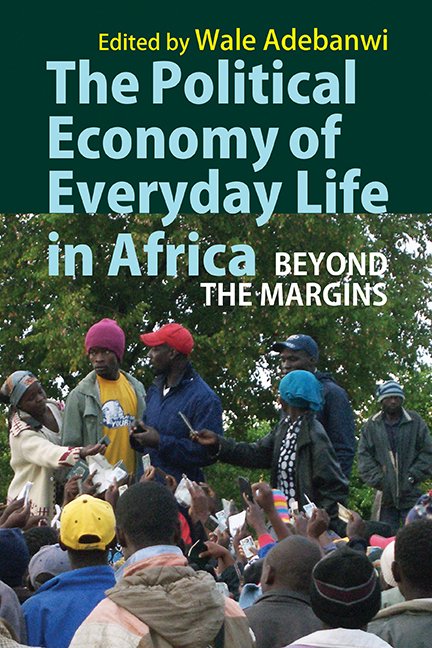Book contents
- Frontmatter
- Dedication
- Contents
- Maps, Illustrations & Tables
- Notes on Contributors
- Foreword
- Acknowledgements
- Approaching the Political Economy of Everyday Life An Introduction
- Part I MONEY MATTERS: CURRENCY & FISCAL LIFE STRUGGLES
- Part II LABOUR, SOCIAL LIVES & PRECARITY
- Part III MARGINALITY, DISAFFECTION & BIO-ECONOMIC DISTRESS
- Part IV HISTORICITY, TEMPORALITY, AGENCY & DEMOCRATIC LIFE
- 11 History as Value Added? Valuing the Past in Africa
- 12 Cultural Mediation, Colonialism & Politics Colonial ‘Truchement’, Postcolonial Translator
- 13 ‘Kos'ona Miran?’ Patronage, Prebendalism & Democratic Life in Contemporary Nigeria
- Afterword: The Landscapes Beyond the Margins Agency, Optimization & the Power of the Empirical
- Index
11 - History as Value Added? Valuing the Past in Africa
from Part IV - HISTORICITY, TEMPORALITY, AGENCY & DEMOCRATIC LIFE
Published online by Cambridge University Press: 31 August 2018
- Frontmatter
- Dedication
- Contents
- Maps, Illustrations & Tables
- Notes on Contributors
- Foreword
- Acknowledgements
- Approaching the Political Economy of Everyday Life An Introduction
- Part I MONEY MATTERS: CURRENCY & FISCAL LIFE STRUGGLES
- Part II LABOUR, SOCIAL LIVES & PRECARITY
- Part III MARGINALITY, DISAFFECTION & BIO-ECONOMIC DISTRESS
- Part IV HISTORICITY, TEMPORALITY, AGENCY & DEMOCRATIC LIFE
- 11 History as Value Added? Valuing the Past in Africa
- 12 Cultural Mediation, Colonialism & Politics Colonial ‘Truchement’, Postcolonial Translator
- 13 ‘Kos'ona Miran?’ Patronage, Prebendalism & Democratic Life in Contemporary Nigeria
- Afterword: The Landscapes Beyond the Margins Agency, Optimization & the Power of the Empirical
- Index
Summary
Introduction
Historical narratives figure prominently in contemporary African affairs. Since the late 1980s, international initiatives seeking to ‘democratize’ African governments and decentralize governing institutions have prompted widespread debate, sometimes conflict, over land claims, citizenship, eligibility for political office, and the relevance of historical precedents for social and political entitlements in the present. Describing the return of electoral politics to a northern Beninese town in the early 1990s, Bako-Arifari wrote that ‘history [was] a subject of permanent discussion’ (1997: 6). By linking authority and resource access to precise delineations of territory and ownership, neoliberal projects for protecting property rights and decentralization intensified debates over local and national belonging, prompting people to search for historical precedents to guide and legitimate social and political action in the present (Bierschenk et al. 2000; Chauveau 2000; Lentz, 2013; Tsikata and Yaro, 2011; Amanor 2012).
Understandings of the past have also been brought to bear in negotiating value in the marketplace. As competition over land and landed property increased in the years after independence, contestants engaged in a vigorous search for historical precedents to validate their claims and discredit those of their rivals. Historical imagination plays a role in a wide array of economic transactions, from the purchase and sale of ‘antiquities’, to loans, outlays on environmental protection, and the production and transmission of historical knowledge itself. Drawing examples from a variety of ethnographic and historical studies of economic conditions and practices in Africa, this chapter reflects on history in the marketplace, asking how history adds value to things transacted in the marketplace, and how the production of history and the constitution of market value inform and reflect on each other.
Markets for History: Objects, Activities, Landscapes & Knowledge
History enters into the negotiation of market value in different ways. Writing of things with ‘historical value, derived from acts of production, use or appropriation that have involved the object in the past’, David Graeber refers specifically to heirlooms – objects preserved and handed on from one generation to the next – and the rich body of anthropological writings that has accumulated on them (2011: 105). The present discussion suggests that history adds value not only to scarce and specialized heirlooms, but also to a wide variety of marketed things that take account of the past in many different ways.
- Type
- Chapter
- Information
- The Political Economy of Everyday Life in AfricaBeyond the Margins, pp. 287 - 307Publisher: Boydell & BrewerPrint publication year: 2017



